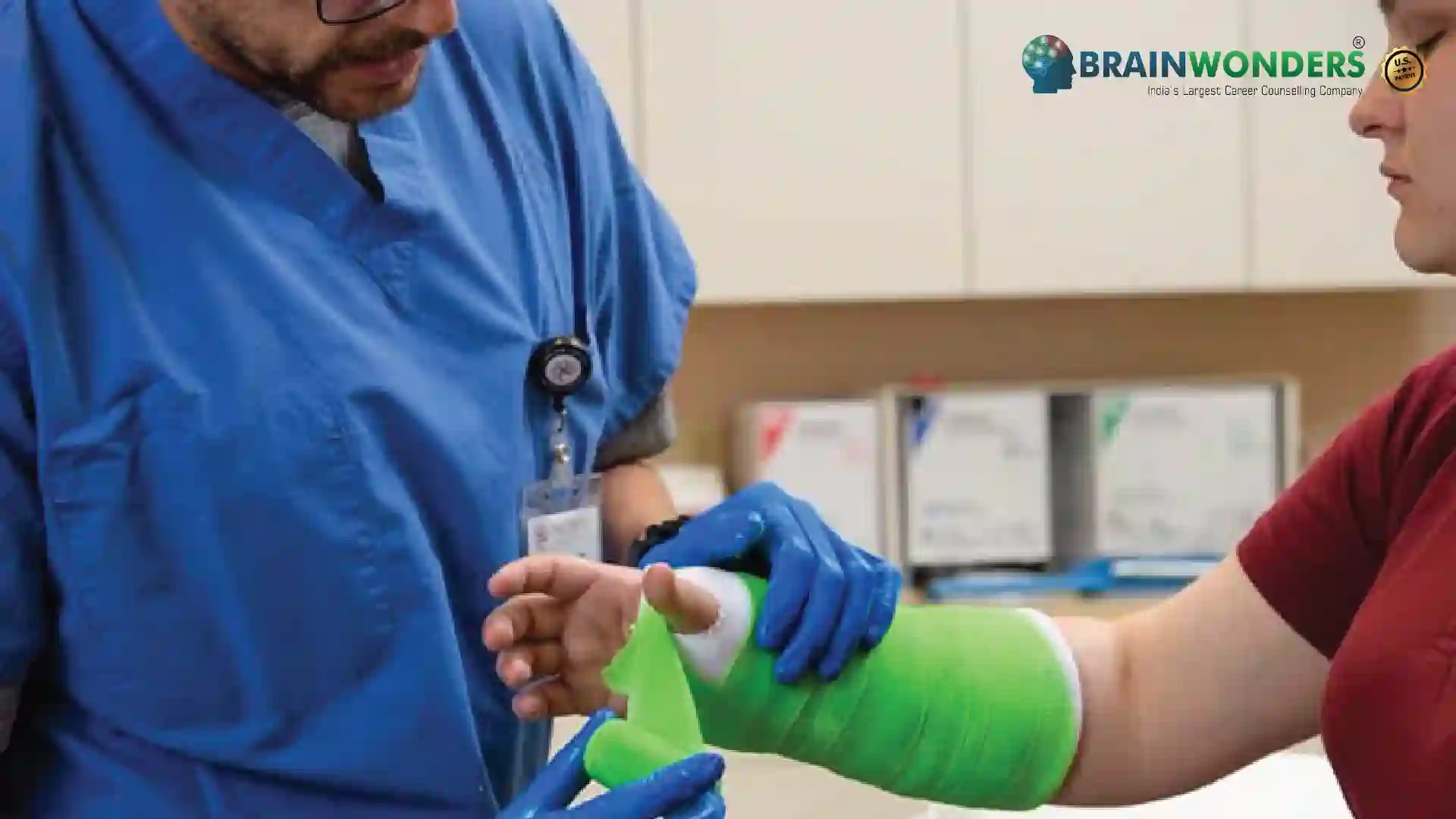How to become an Orthopaedic Technologist
Overview, Courses, Exam, Colleges, Pathways, Salary

Overview
Who is Orthopaedic Technologist ?
An orthopedic technologist is a specialized healthcare professional dedicated to assisting orthopedic surgeons and other medical practitioners in diagnosing, treating, and managing musculoskeletal conditions and injuries. With a unique blend of technical expertise and medical knowledge, orthopedic technologists play a vital role in delivering comprehensive orthopedic care.
These professionals are skilled in orthopedics, including pre-operative preparation, surgical assistance, and post-operative care. They work closely with orthopedic surgeons to ensure the seamless execution of procedures, including preparing surgical instruments, setting up surgical suites, and providing direct assistance during surgeries. Additionally, orthopedic technologists excel in applying casts, splints, braces, and other orthopedic devices to support patient recovery and rehabilitation.
Orthopedic technologists deeply understand musculoskeletal anatomy, biomechanics, and medical terminology. They are proficient in conducting diagnostic tests, such as X-rays and orthopedic measurements, in aiding in assessing injuries and conditions. Their expertise extends to patient education, guiding individuals on proper device usage, post-operative care, and exercises to enhance mobility and strength.
Typical day at work
What does Orthopaedic Technologist do?
Job description, Profiles, Roles and Duties:
- In charge of applying, adjusting and removing the cast
- Application of cast by utilizing plaster or synthetic materials
- Measurement and fitting orthopaedic equipment and ambulatory aids for patients
- Help in traction operation, maintenance and modification (skin, skeletal as well as manual)
- Use a sterile technique to take out sutures, k- wires, pins and external fixators
- Application and removal of dressings and assessing wound condition before further treatment
- Making and applying splints and bandages
- Educate the patient/family to take care of the cast, slab and skincare
- Strengthen physician's instructions of medical information on particular injury and treatment
- Ordering and maintaining various types of equipment
- Take care of orthopaedic supplies
- Elimination of sutures, staples, K-wires, pins and exterior fixators utilizing appropriate technique
- Team up, as needed, with other health practitioners like physicians, nurses, physiotherapists and occupational therapists
- Communicate with other departments (medical records, radiology) to acquire the resources required to support patient care
- Ensuring dignity and confidentiality of patients
- In charge of cataloguing and documenting precise notes and records
- Responsible for diagramming and documentation, and accurate records and notes
- Deliver other health coaching and demonstration of casting procedures to professionals (pupils, interns) on call
Abilities and Aptitude needed
What are the skills, abilities & aptitude needed to become Orthopaedic Technologist?
- An orthopaedic technologist deals with patients and paperwork daily. A major chunk of the job entails the skill to gauge several situations and apply the technique that will best serve the patient. Communication skills are also critical in this role, to team up with other members of the healthcare team, mainly in the orthopaedic division, and sometimes, as is the skill to communicate with patients- particularly those who may be in discomfort or extreme pain.
- In addition to being experts in the various materials and tools involved in the application and removal of casts, splints, and braces, orthopaedic technologists must demonstrate a strong awareness of the terminologies involved in anatomy, physiology, and medicine.
- They have to demonstrate good interpersonal aptitude to work with patients and teach them to take care of their injuries and build positive relationships with patients/families. If an orthopaedic technician enters the operating room to help orthopaedic surgeons, he or she must be well-versed with protocols regarding sterilization and infection.
- The Orthopedic Technician/Technologist works under the provisions of the Occupational Health and Safety Act and adheres to all guidelines, procedures, and provisions of health and safety recognized by management.
Salary
Salary for Orthopaedic Technologist?
Salary of an Orthopaedic Technologist is as follows :
- Minimum Monthly Salary: Entry-level orthopedic technologists can expect a monthly salary ranging from INR 15,000 to INR 25,000. These initial earnings are typical for individuals who have recently completed their training and are beginning their careers in this field.
- Maximum Monthly Salary: Highly experienced and specialized orthopedic technologists with advanced skills, years of service, and roles in technical areas of orthopedics may earn anywhere from INR 50,000 to INR 1,00,000 or more per month. Those working with renowned medical institutions, specializing in complex musculoskeletal conditions, or contributing to orthopedic research and advancements may command higher salaries.
- Annual Salary: The annual salary for entry-level or junior orthopedic technologists could range from INR 1,80,000 to INR 3,00,000. As orthopedic technologists gain experience, develop expertise in specific musculoskeletal conditions, and potentially take supervisory roles, their annual income can increase from approximately INR 4,00,000 to INR 8,00,000 or higher.
- Highest Paying Jobs and Scope: Orthopaedic technologists specializing in orthopedic trauma care, joint replacement, sports medicine, or working with patients with complex musculoskeletal conditions often enjoy better salary prospects. Those who contribute to innovative treatment plans, collaborate with orthopedic surgeons, or work on significant patient rehabilitation projects may have enhanced earnings. Orthopedic technologists support orthopedic surgeries, patient care, and device management. With the increasing demand for orthopedic care and advancements in medical technology, skilled orthopedic technologists are expected to have promising career opportunities. Professionals who excel in surgical assistance, orthopedic device management, attention to detail, and effective communication will likely experience substantial career growth and advancement within the field of orthopedics.
Pathways
How to become an Orthopaedic Technologist?
Entrance Exam
Entrance Exam for Orthopaedic Technologist ?
Courses
Which course I can pursue?
Best Colleges
Which are the best colleges to attend to become an Orthopaedic Technologist?
Industries
Which Industries are open for Orthopaedic Technologist?
Orthopedic technologists can find opportunities in various healthcare, orthopedics, and medical device management industries. Here are some industries where orthopedic technologists can work:
- Hospitals and Medical Centers: Many orthopedic technologists are employed in hospitals and medical centers, where they assist orthopedic surgeons and other healthcare professionals in surgical procedures, patient care, and orthopedic device management.
- Orthopedic Clinics: Specialized orthopedic clinics provide focused care for musculoskeletal conditions, sports injuries, and joint replacements. Orthopedic technologists play a crucial role in supporting patient assessments and treatment.
- Rehabilitation Facilities: Orthopedic technologists may work in rehabilitation centers, assisting with therapeutic exercises, mobility training, and orthopedic device fitting for patients recovering from injuries or surgeries.
- Surgical Centers: Orthopedic technologists can work in surgical settings, participating in orthopedic surgeries, preparing surgical instruments, and assisting in the operating room.
- Orthopedic Equipment Companies: Some orthopedic technologists are employed by companies that manufacture and distribute orthopedic devices, implants, and equipment. They may be involved in product development, testing, sales, and customer support.
- Physical Therapy Clinics: Orthopedic technologists may collaborate with physical therapists in clinics to support patients undergoing orthopedic rehabilitation.
- Sports Teams and Athletic Organizations: Orthopedic technologists may be employed by sports teams or athletic organizations to provide orthopedic care to athletes, including injury assessment, taping, bracing, and sideline support.
- Medical Supply and Device Distributors: Working for medical supply and device distributors allows orthopedic technologists to gain insights into the distribution and sales of orthopedic products.
- Nursing Homes and Long-Term Care Facilities: Orthopedic technologists may work in nursing homes and long-term care facilities, assisting with mobility devices, orthotics, and other orthopedic needs for elderly residents.
- Research and Development: Some orthopedic technologists may contribute to research and development efforts in the orthopedic industry, working on innovative technologies and devices.
- Academic Institutions: Orthopedic technologists may teach or work in academic medical centers associated with universities, contributing to educational initiatives, clinical training, and research.
- Government Healthcare Agencies: Government agencies or public health organizations may employ orthopedic technologists to provide orthopedic care in underserved communities or during emergencies.
- Home Healthcare Services: Orthopedic technologists may provide home healthcare services, visiting patients at their homes to assist with orthopedic device management and rehabilitation.
- Outpatient Surgery Centers: Some orthopedic technologists work in outpatient surgery centers, assisting in orthopedic surgeries and providing post-operative care.
internship
Are there internships available for Orthopaedic Technologist?
Internship opportunities for orthopedic technologists can provide valuable hands-on experience in clinical settings, assisting with patient care, orthopedic procedures, and medical device management. Here are some potential places to find internships as an orthopedic technologist:
- Hospitals and Medical Centers: Many hospitals offer internship programs where orthopedic technologists can work alongside orthopedic surgeons, nurses, and other healthcare professionals. Interns may assist with casting, splinting, wound care, and patient education.
- Orthopedic Clinics: Specialized orthopedic clinics that focus on specific areas such as sports medicine, joint replacement, or trauma care may offer internships for technologists to gain specialized skills and experience.
- Rehabilitation Facilities: Facilities that provide orthopedic rehabilitation services may offer internships for technologists to assist in therapeutic exercises, mobility training, and patient assessments.
- Surgical Centers: Orthopedic technologists may find internship opportunities in surgical settings, where they can assist during orthopedic surgeries and gain experience in the operating room.
- Orthopedic Equipment Companies: Companies that manufacture and distribute orthopedic devices, implants, and equipment may offer internships for technologists to learn about product development, testing, and sales.
- Physical Therapy Clinics: Some physical therapy clinics work closely with orthopedic technologists to provide comprehensive care to patients recovering from orthopedic injuries or surgeries.
- Medical Supply and Device Distributors: Interning with medical supply and device distributors can provide exposure to the supply chain and distribution process for orthopedic products.
- Academic Institutions: Orthopedic technologists may intern in academic medical centers associated with universities, where they can participate in clinical rotations, research projects, and educational initiatives.
- Sports Teams and Athletic Organizations: Interning with sports teams or athletic organizations can provide experience in orthopedic care for athletes, including injury assessment, taping, and bracing.
- Nursing Homes and Long-Term Care Facilities: Facilities that care for older people often require orthopedic technologists to assist with mobility devices, orthotics, and other orthopedic needs.
- Government Healthcare Agencies: Some government agencies or public health organizations may offer internships for orthopedic technologists to assist in providing orthopedic care to underserved populations.
Career outlook
What does the future look like for Orthopaedic Technologist?
The future for Orthopaedic Technologists appears promising and dynamic. As the healthcare industry advances, the demand for skilled professionals specializing in musculoskeletal care is expected to grow. Orthopaedic Technologists will be crucial in supporting orthopedic surgeries, assisting in patient care, and contributing to technological and procedural advancements. Opportunities are likely to expand with an aging population and increased focus on sports medicine and orthopedic rehabilitation. Collaboration with orthopedic surgeons and multidisciplinary teams will remain essential. As technology evolves, Orthopaedic Technologists who stay updated on innovative techniques and medical devices will be in high demand, ensuring a fulfilling and impactful career path in the ever-evolving field of orthopedic medicine.




.webp)


